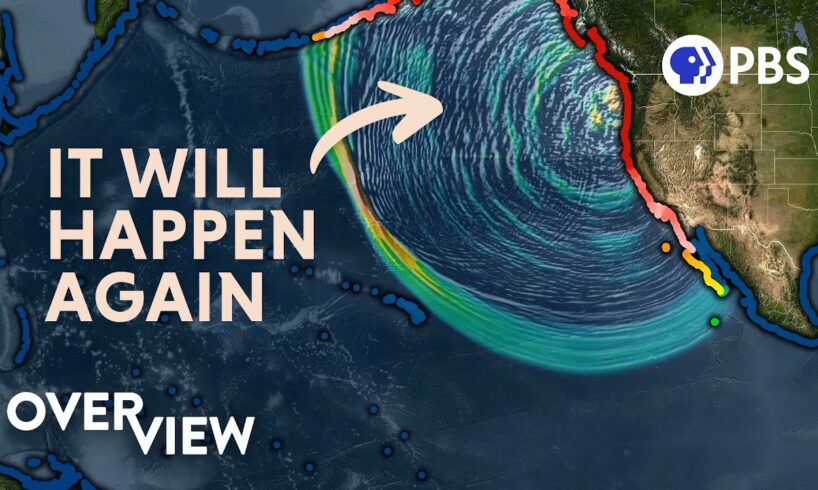
The 1700 Cascadia earthquake and tsunami was a massive natural disaster that reshaped the Pacific Northwest. Through tree rings, soil layers, and international collaboration, scientists have pieced together the exact timing of the event. As the region braces for another quake, can we prepare in time? Find out how new models and tsunami evacuation towers are helping coastal communities face the threat.
*****
PBS Member Stations rely on viewers like you. To support your local station, go to: http://to.pbs.org/DonateTerra
*****
Subscribe to PBS Terra so you never miss an episode! https://bit.ly/3mOfd77
And keep up with PBS Terra on:
Facebook: https://facebook.com/pbsdigitalstudios
Tiktok: https://www.tiktok.com/@pbsterra
Instagram: https://instagram.com/pbsterra
source







Um. People could write 300 years ago. And keep track of time. Ffs.
You forgot to mention that geologists found multiple sediment layers, each around 200 years apart. The fact that the last event happened 300 years ago means it really can happen any moment now. Which baffles me is that there is only ONE tsunami tower right now. Is this not common knowledge in the US? Even Dutch news covered this story
Growing up in Oregon, we would have this wonderful lady from the Coos Tribe come to our high school and teach us about her indigenous culture. The Coos tribe is a coastal tribe in Southern Oregon. And she told us her tribe’s oral history about the tsunami (that historians are pretty sure was the 1700 tsunami) that washed away an entire village and the only people who survived were those who could get to the mountains. It was really cool but scary!
Written language did not arrive with settlers 😂😂😂
You mean Nagasaki? It's was a Japan to Cali and we flooded :3
that tsunami evacuation zone is kinda useless when its behind lock and key
One vital piece of information that should have been made mention is the “orphan tsunami”. While yes Japanese coastal villages had record of several tsunamis, the last actual Cascadia subduction zone tsunami was different from all the tsunamis the Japanese coast experienced, making it a strange unexpected phenomenon. In Japanese historical records this tsunami was literally named an “orphan tsunami,” a tsunami without its ‘parent’ earthquake. Every tsunami the coast of Japan had experienced until that one in 1700, had a parent earthquake. This points to the fact that the orphan tsunami of 1700 had its parent earthquake happen far away across the ocean… which was here in the Pacific Northwest.
I hate these videos. All they do is act as more justification to not give grant money to the PNW coast. We all pay taxes for the Gulf Coast to recover from hurricanes every single year but no one will help us build new schools or hospitals because “the big one is coming”. Stop talking about it until you’re going to help the poorest region of the West Coast.
The two things that I found most fascinating when studying Geology in college were: The various types of rocks studied locally and how they developed and came to be, and the perception change in that I adopted the way of looking at landscape and living history that one can tap into and learn the past by utilizing the tools developed, taught and ulitilized. Incredible.
Glad to see, after 500 years of abuse at the hands of european invaders, the tribes are finally being noticed.
It's pronounced *fyoo-cuh" not fooka. Just fyi.
I absolutely love such things
The 'megaquake' tsunami did a hard 180° and took out a fjord in SE Alaska, trees gone up to 300'MSL. They call it 'curving' and it has to do with pretending an Alaskan tsunami actually originated off the WA coast, because that's where Fed research grants for deep sea fishing charter fleet is.😅
Well… On a positive note- If this happens and we survive there's going to be A LOT of Gold again. 🤷🏾
Have been surfing in WA state for decades, watching buoy readings, etc. There's been some interesting anomalies with buoys dropping 10's of feet and river mouths or inlets getting small tsunamis mistaken for sneaker or rogue waves in past newsreels. Some I think are from underwater landslides or smaller localized events in the zone.. but an interesting, beautiful and unique place out on our peninsula.
As a geology graduate, the fact that those tress are no longer under water is worrying.
Juan de Fuca–Foo Kah? Foo Kah? As a 5th generation Seattlite I can tell you unequivocally….it's FEW KAH!! FEW KAH!! Idiots. Get pronunciation guides damn it! Don't care how Spanish speakers say it; this is now OUR term, name, words. FEW KAH!!!
Tower supposed to save people vs Murican idiocy locking it with really strong lock and fence going to the top making sure people can't crawl over it: gee, I wonder what will win in emergency?
Wait! The evacuation tower is 50 ft high, but the potential wave could be 65 feet. 😮
I’m guessing it wiped out a lot of the people that were living along the coast at the time… which were probably a lot.
So how much money and time was wasted on getting these superfluous academics to research something that we can't predict and can't do anything about?
We have so many useless over educated people costing us a fortune.
It probably won't or will and probably at another plate no one knows
I generally don't like fearmongering phrases like 'overdue' when people talk about natural disasters, especially geologic ones. The term 'hundred year flood' means that on average a flood of that depth happens once every century or so. That doesn't mean one is 'overdue' if it's been a hundred years since the last one. Many factors go into geologic events, and the time scale some of them operate on are far longer than the existence of primates. For example, Yellowstone might never go off in its current location again, the hot spot may have moved (or rather, the north american continental plate may have moved) far enough that the yellowstone basin is no longer being directly heated by it, and it may be a another million or two years before it pops up to the northeast, just like it has done for over fifty million years that we've tracked eruptions related to that hot spot back along the Snake River Valley.
To claim any sort of natural disaster is 'overdue' is falling victim to the Gambler's Fallacy. Mankind's desire to see patterns where none truly exist, and to make rational sense out of the irrational.
Having said that, preparedness is always a good idea for these sorts of things, because they're certain to cause massive loss of life should they happen again while humans still exist. Understanding the threat and preparing for the threat is essential in minimizing the loss of life. I applaud the communities that have taken this seriously enough to come up with reasonable solutions, if for no other reason than it minimizes what is probably the biggest killer of all: fear and panic. Because at the end of the day? We just don't know. We don't have the ability to measure the compression in the Cascadia Subduction Zone with nearly the accuracy we'd need to be able to even remotely accurately predict the next one. But if the recent 7.0 down in Cali is any basis for comparison? Panic will inflate death tolls significantly. So anything that can be done to mitigate that panic, to encourage people to think rationally and to act quickly and decisively to save lives, is worth the price.
Could we harvest power from it like a big rubber concrete dampener?
5:25 Really really uncomfortable with the throw away line reference to the local tribes oral histories. While they might not have dates that conform to the european calendar, their histories are accurate and go back thousands of years further. I would bet the tribes also know where to be to avoid the Tsunami if you thought to ask?
HOW DO PEOPLE LIVE ON THIS COASTLINE 😱
Good job the Trump administration is going to be in place and WILL have a plan
In millions of years, creationists will point to those trees to claim the Earth is young.
Honestly, I like the ghost forest just south of Lincoln City; you can see, very clearly, where the coastline was, and where it changed, all from 101
2:25 Shoutout to Old Town Canoe from my home state of Maine!
Why not allow Amazon to rebuild nuclear reactors at the Hanford toxic waste site?!
I have great respect for the scientists and their tools/techniques and their conclusions. However, their predictions could be much worse or much less destructive or much farther into the future or much sooner. I recognize that we are all just temporary mortals on this earth.
Sensationalism to the max! 😜
Be afraid, be very, very afraid is your stupid point? Come on! You could have spent this 13:30 minutes explaining the actual science of earth tectonic processes or what it means to live on the Pacific Ring of Fire and why tectonic events have happened throughout geologic time and why they will happen again. But no! It's always the doom & gloom approach.
Why? 🤔
Very good timeing of this video givin how much the northern extension of the San Andreas fault has been shaking this past month.
Very interesting, but could we please get something straight? The Pacific Northwest is actually more like Alaska. Myopic views just make things more confusing.
In 1964, the Cook Inlet near Anchorage, Alaska dropped 30 feet from the 9.2 earthquake in Valdez.
Guarantee that tower falls.
It is a Soonanmi.
why does the tower not have walls at the top if they're going to provide tarps? lol
I remember hearing the story of The Orphan Tsunami. For centuries the Japanese understood that when an earthquake occurs, you head for higher ground, because it will spawn a tsunami. But in 1700, a tsunami suddenly appeared with no warning, and destroyed three coastal villages, killing more than 10,000 people. They couldn't understand how a tsunami could occur without an earthquake, so they named it The Orphan Tsunami.
It wasn't until the researchers in our Pacific Northwest found evidence of a massive earthquake that the pieces started to fit together. The native Americans living at the time did not have any written records, and the scientists could only estimate that the earthquake had occurred around the beginning of the 18th century. But the Japanese did have records of exactly when their Orphan Tsunami had appeared, and when the researchers on both sides of the Pacific started talking to each other, the 300-year-old mystery was solved.